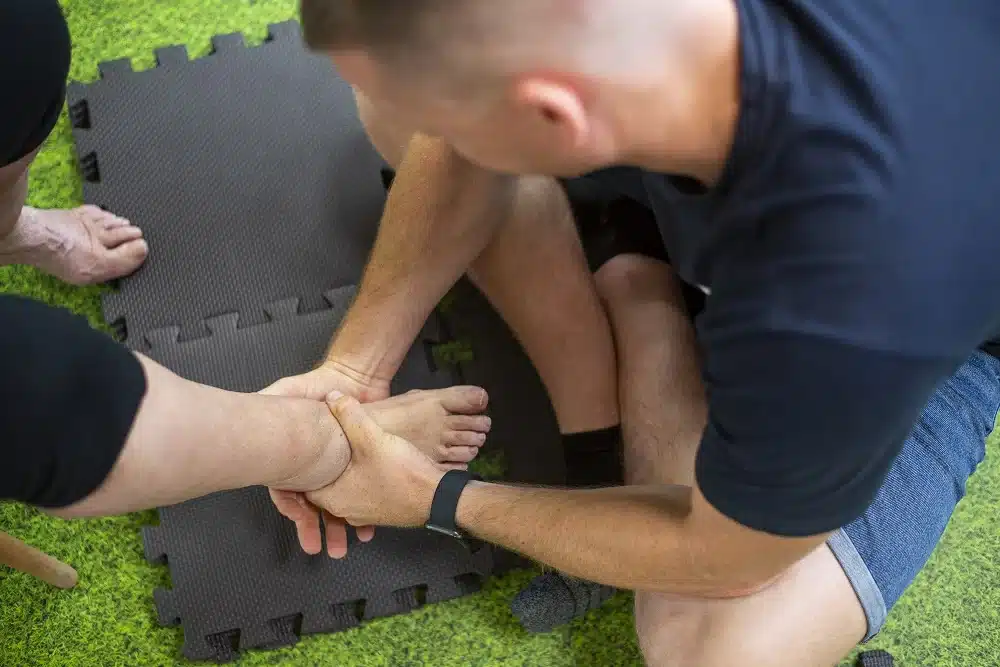Multiple Sclerosis (MS) is a chronic disease of the central nervous system that can cause a wide range of symptoms, including muscle weakness, balance and coordination problems, fatigue, cognitive difficulties, and speech and swallowing impairments.
As the disease progresses, these symptoms can significantly affect patients’ quality of life. However, through specialised neurological rehabilitation programmes, patients with MS can learn to manage their symptoms, improve their functionality, and maintain their independence for as long as possible.
One of the fundamental pillars of neurological rehabilitation for MS is physical and occupational therapy. These programmes are designed to help patients improve their muscle strength, balance, coordination, and mobility.
Physical therapists work with patients to develop a personalised exercise plan tailored to their individual needs and abilities.
This may include strength training exercises to strengthen weakened muscles, balance exercises to improve stability, and activities to enhance fine motor skills such as writing or buttoning.
Occupational therapy focuses on helping patients perform activities of daily living independently and safely. This may include training in the use of assistive devices such as canes, walkers, or wheelchairs, as well as energy conservation techniques to combat fatigue.
Occupational therapists may also work on adapting the home environment to make it more accessible and safe for patients with MS.
Another important component of neurological rehabilitation for MS is speech and language therapy. Many patients with MS experience difficulties in speech, swallowing, or communication due to muscle weakness or cognitive dysfunction.
Speech and language therapists work with these patients to improve articulation, speech fluency, and language comprehension. They may also teach techniques to improve swallowing and reduce the risk of aspiration.
Cognitive rehabilitation is another crucial aspect of MS treatment. The disease can affect cognitive function, including memory, attention, processing speed, and problem-solving. Cognitive rehabilitation programmes may include memory exercises, puzzles, and games to improve attention and concentration, as well as strategies to facilitate problem-solving.
These programmes can be especially helpful for patients experiencing difficulties at work, school, or daily activities due to cognitive issues.
Functional Electrical Stimulation (FES) therapy is an innovative technique that can benefit patients with MS experiencing muscle weakness or motor dysfunction. FES uses small electrical currents to stimulate paralyzed or weakened muscles, which can improve muscle strength and motor function.
This technique can be especially useful for improving gait and mobility in patients with MS experiencing walking difficulties.
In addition to these specific programmes, regular exercise can also be beneficial for patients with MS. Exercise can help improve muscle strength, flexibility, balance, and endurance, as well as reduce fatigue and improve overall well-being. However, it is important for exercise programmes to be tailored to the individual needs and abilities of each patient and to be supervised by healthcare professionals specialised in MS treatment.
In summary, neurological rehabilitation plays a fundamental role in the treatment of Multiple Sclerosis. Through physical and occupational therapy, speech and language therapy, cognitive rehabilitation, functional electrical stimulation therapy, and adapted exercise, patients with MS can learn to manage their symptoms, improve their functionality, and maintain their independence for as long as possible. These programmes not only help patients improve their quality of life but also provide them with hope and empowerment in their struggle against this chronic and debilitating disease.
Leave us your data to start your treatment







